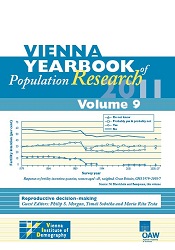 |
Vienna Yearbook of Population Research 2011
|
 |
Verlag der Österreichischen Akademie der Wissenschaften Austrian Academy of Sciences Press
A-1011 Wien, Dr. Ignaz Seipel-Platz 2
Tel. +43-1-515 81/DW 3420, Fax +43-1-515 81/DW 3400 https://verlag.oeaw.ac.at, e-mail: verlag@oeaw.ac.at |
|
||||||||||||||||||||
|
DATUM, UNTERSCHRIFT / DATE, SIGNATURE
BANK AUSTRIA CREDITANSTALT, WIEN (IBAN AT04 1100 0006 2280 0100, BIC BKAUATWW), DEUTSCHE BANK MÜNCHEN (IBAN DE16 7007 0024 0238 8270 00, BIC DEUTDEDBMUC)
|

Vienna Yearbook of Population Research 2011, pp. 283-306, 2012/02/02
doi: 10.1553/populationyearbook2011s283

Childbearing in low-fertility societies sometimes results from a strong desire to have a(nother) child. Since women tend to dominate discussions on ‘baby longing’ or ‘baby fever’, it is not clear whether men also feel the powerful urge to have a child. Moreover, the demographic importance of baby longing has yet to be assessed. Using cross-sectional surveys from contemporary Finland and focusing on men, we analyse gender differences in baby longing. Both sexes report having felt an intense longing to have a child of their own at least once or a few times in their lives. A higher proportion of men say they have never longed for a child, while a higher proportion of women report having felt this longing frequently. Baby longing figures at different stages of the Traits- Desires-Intentions-Behaviour scheme of reproductive behaviour. For a small minority of men, longing first appears in youth. Baby longing among men most commonly plays into childbearing desires preceding attempts to achieve pregnancy. However, about every third man reports having first felt this longing only when trying to have a child. Baby longing among men is unrelated to economic and educational status, but it is associated with marital status, fertility intentions and the number of lifetime unions. Compared to its effects on women, baby longing among men is reported to result in having a child less often and to have less influence on childbearing decisions. We conclude that women’s longing shapes the couple’s fertility behaviour to a slightly higher degree than men’s longing does, especially with regards to higher parities. Men’s baby longing may be especially important for sustaining proceptive behaviour and preparing for fatherhood.
Published Online: 2012/02/02 15:37:52
Object Identifier: 0xc1aa5572 0x002a70ff
Document viewed: Calculating...
Rights: All rights reserved. For questions regarding copyright and copies please contact us by email.
